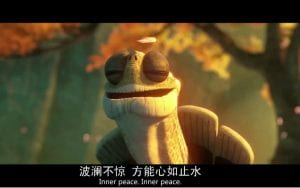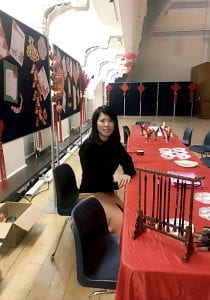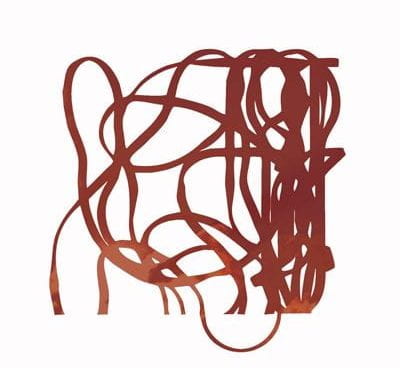
Many people think that Taoism is a hermit philosophy. Its focus is on the criticism and transcendence of reality, not the construction of reality. So in terms of governing a country, it cannot be compared with other Chinese philosophies.
Among all these misconceptions on Taoism, one is the core value of it—Wuwei. Wuwei is the basic idea of Taoism and the basic method of its practice. The idea has been translated into many words like:
“non-action”
“ruling by doing nothing”
or
“governance without actions”
These are all good terms, however, they are also liable to cause misunderstandings. While Wuwei might seem a rather distant and intangible philosophical concept for many, this popular cartoon image might help you to understand the concept more clearly.

Turtle in Chinese is Wugui, a homophone of Wuwei. In this movie, the turtle demonstrates rather an authentic form of Taoism thinking—inaction.
Wuwei was first proposed by the ancient Chinese philosopher, Lao Tzu who believed that all things in the world are produced by Tao and running with Tao.
The movements of all things in the world follow the law of Tao. So what is the law of Taoism?
Lao Tzu said:
“Humanity, earth, earth, heaven, heaven, law, and Taoism are natural.”
(Daode Jing · Chapter 25)
Thus, we can deduce that the most fundamental law of Tao is nature or the primitive cosmology. Since Tao is based on nature, then things should develop naturally and take their natural course, so that they can be in a natural state consistent with the Tao. Without interfering with Tao, and without affecting things with human’s selfish intention, can things exist normally and develop healthily, so that the ruler can govern a country effortlessly and peacefully. Therefore, in the view of Taoism, dealing with people and cultivating one’s mind should be based on natural inaction, and avoid delusions.
Lao Tzu said:
“Teach the saint to do Wuwei, do the teaching without saying a word.”
(Tao Te Ching · Chapter 2)
“In moral virtue, there is nothing to do; under moral virtue, there is thought.”
(Tao Te Ching · Chapters 38 )
“ For learning day by day, for the loss of the Tao, and the loss is so bad that resulted in inaction. Action by inaction.”
( Tao Te Ching ·Chapters 48)
In short, according to the Taoist view, under the state of natural inaction, things can develop smoothly according to their own laws, as well as the body and society. If humans interfere with the development process of things or change the natural state of things in accordance with a certain subjective desire, the result will only be like this Chinese idiom:
“ Help the shoots grow by pulling them upwards”.
Therefore, wise people should adopt inaction to maintain health and govern the world. Only in this way can the goals be achieved.
Of course, “governing inaction” is by no means doing nothing. “Doing nothing” means you just let it be and be lazy in ruling. But “governing inaction” means not doing things at your own selfish will and not acting against the rules.
On the contrary, for things that are in line with the Tao, you must do what you want. But what you do should be in agreement with nature, and follow nature’s law; do it by nature, not by man. So this kind of behaviour will not only avoid destroying the natural process and natural order but benefit the natural development and growth.
In modern society, with the development of science and technology, not only have people’s material lives been greatly improved but also people’s spiritual lives have become more and more abundant. However, in sharp contrast to this, people’s happiness in life has not improved with the improvement of living standards; on the contrary, in many cases, people feel more unhappy and unhappy than before.
The reason is that modern society is presented in front of people with many colourful forms. In the face of various material and spiritual temptations, people’s needs and desires have been unprecedentedly stimulated, but people’s ability to meet their needs and desires is limited, which leads to endless pain and annoyance in people’s hearts.
‘…people’s ability to meet their needs and desires is limited, which leads to endless pain and annoyance in people’s hearts.’
In fact, according to Taoism, all the pains and worries in life are derived from human beings going off-track from Tao. People are not satisfied with the existing natural state, but always try to transform life according to their own wishes and the requirements of others and imagine that this will make life better. As everyone knows, this destruction of natural life order seems to bring immediate happiness and joy to people, but it’s doomed to cause natural disasters and endless pains in this world.
“Whatever has happened before will happen again. Whatever has been done before will be done again. There is nothing new under the sun.”
Things may change as time flies but the Tao will be always the same.
It’s time for our modern people to abandon arrogance and search for the laws of harmony with nature through continuous reflection and self- examination.

Lingling Shan graduated from Jilin University in 1999. Her special interests in cultural differences between the West and the East have nourished her teaching and research. She has spent time in the United States as a visiting scholar (2014-2015) and researched on Religious Differences in China and America.
Here in the department, Lingling currently lectures in Chinese on our Undergraduate Chinese studies programmes. She also lectures on our credit course modules in Chinese Philosophy and Chinese History open to all Goldsmiths students and oversees our HSK training short courses.
